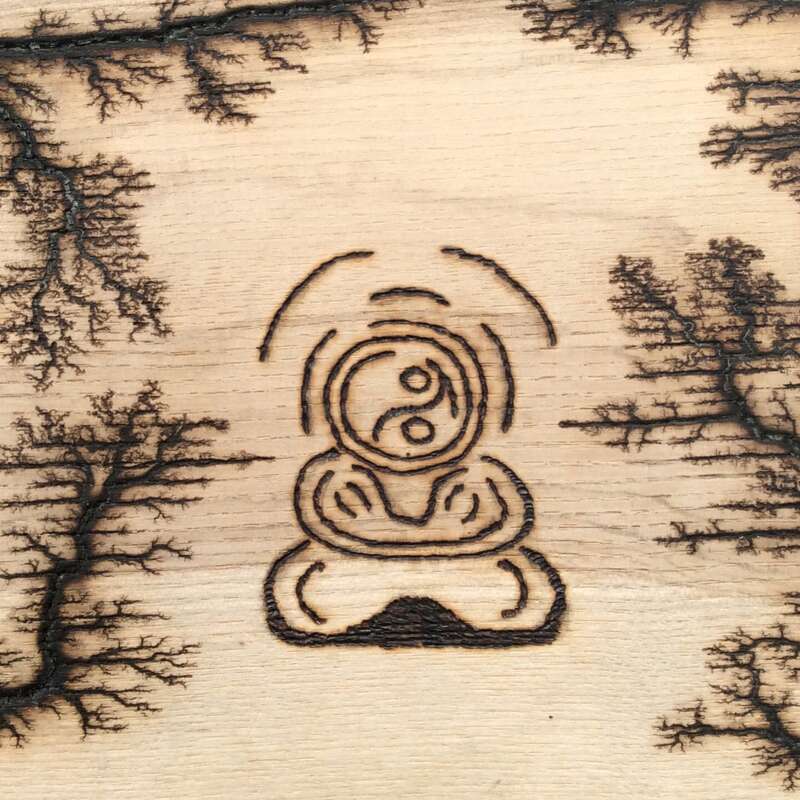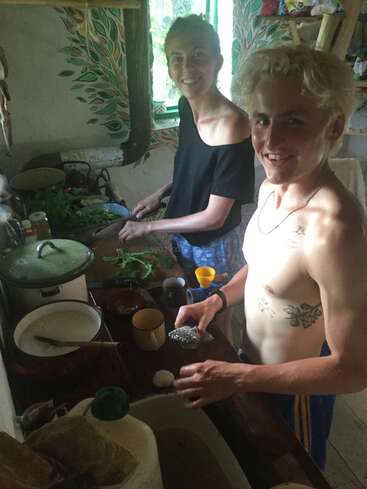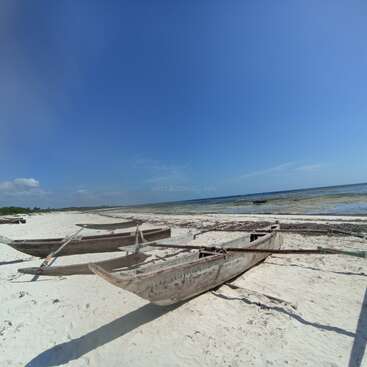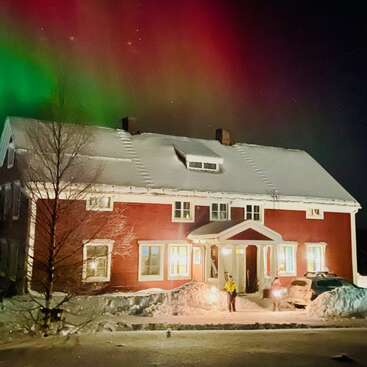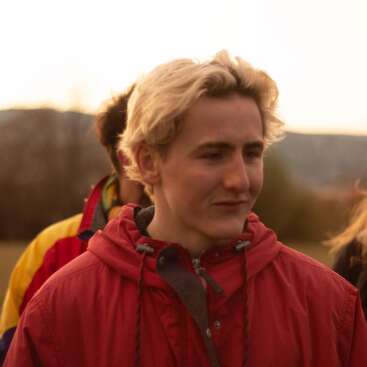Profilangaben

Host Bewertung
65 %

Letzte Antwort
16 Juni 2025

Feedback
2

Verifizierte E-Mail
Country info
Abzeichen (2)


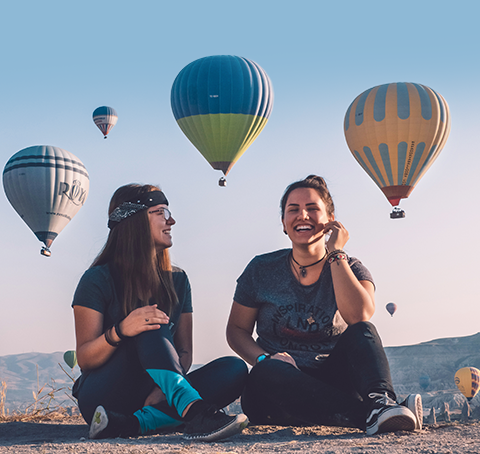
Finde deinen perfekten Gastgeber
Geforderte Mindest-Aufenthaltsdauer: mindestens 1 Woche
Informationen

Beschreibung
The place was established in 2012 by Ondřej and his Japanese ex-partner Fukiko in a remote mountain area in Romania as a basement for their anthropological studies of the traditional local Czech farming community. Soon Kolíba developed into an organic family farm focusing on self-sufficiency and aiming the independency and “off the grid” way of living.
Achieving this in 2015, the self-sufficient goals have been gradually put aside and since 2016 the farm transformed into Ondřej’s personal hermitage focusing more on spiritual practice, art and basic gardening. From 2014 to 2019 the farm/hermitage was hosting various volunteers and students as well as being a basement for one-week-long silent zen-yoga retreats (including trekking and farming training).
Recently the place has gain a communal character. It is open to all who wish to grow and rise their consciousness through regular zen and yoga practice, as well as through art, farming and outdoor sport activities. And, of course, who are ready and willing to train and cultivate their personality through communal way of living.
Ashram is open from middle May to middle September.
Longer stays (at least one or two weeks) are preferred over short visits.
Arten von Hilfe und Lernmöglichkeiten
Kunstprojekte
Hilfe bei Ökoprojekten
Gartenarbeiten
Zubereiten / Kochen von Mahlzeiten für die Familie
Hausarbeiten
Handwerkliche Arbeiten

UNO-Ziele für nachhaltige Entwicklung, die dieser Gastgeber verfolgt

Kultureller Austausch und Lernmöglichkeiten
The main activity in ashram is zen and yoga practice which is also the main topic of study. Apart from that there is a possibility to learn about original Czech and Romanian traditional rural culture, about organic gardening and self-sufficiency, about natural constructions, and the basics of various arts and alternative approach to outdoor sports like rock-climbing and trekking. But, of course, the main thing to learn is the world of oneself through establishing the connection with one’s own body, mind and inner identity

Arbeit
Ashram has a set schedule but volunteers are free to join the practice, art and outdoor sport activities according to their own will.
The pillar of the daily schedule is the ZEN MEDITATION (Zazen or Kinhin) and HATHA-YOGA (or dance-based) exercise.
Zen is practiced two times a day in 30-50 minutes long sessions.
Yoga is practiced once per day 60-120 minutes. Both, yoga and meditation, are practiced daily apart from Saturday evening and Sunday. Both are happening outside. In case of difficult weather the Zazen is held in a big tent and yoga is omitted.
The rest of the day is filled with farming, maintenance and cooking work, or with art (music, dance, juggling, theatre, painting, carving etc.) and specific outdoor activities (rock- climbing, trekking, slack-lining etc.)
The farming and maintaining works usually consist of permaculture gardening, gathering herbs and making herb oils, natural building and restoration projects, gathering and preparing firewood or clearing the surrounding land from bushes and thorns in order to preserve its traditional and rich rural character. All works are done by hand with absence of heavy machines
Gesprochene Sprachen
Czech: Fließend
Englisch: Fließend
Japanisch: Grundkenntnisse
Romanian: Grundkenntnisse
Unterkunft
The ashram itself is a modest natural place with two small buildings and basic living and farming equipment. It was made out of a shepherd cottage, built from cob and wood in 1933.
Visitors stays in caravan (2-4 people) and tents (6-12 people) which are provided. It is also possible to bring one’s own tent or a van (there are many possibilities to park the car on the meadows surrounding the ashram).
Drinking water comes from a mountain spring 200m far from the main house where there is also installed a basic cold shower system. At the same place washing clothes by hand is done. For washing body, clothes and dishes ONLY BIO-DEGRADABLE and NATURAL SOAPS and
SHAMPOOS are used (please, don’t use anything else).
For watering the garden and for personal refreshment one can find 5m wide second-hand
swimming pool. Available is also wood-stove-heated sauna.
Basic solar system provides the possibility to charge a phone or tablet through USB. The place itself is (surprisingly) reached by very good 4G signal.
We provide food for volunteers.
Vegetarian meals are prepared for everybody by cooking teams (consisting of visitors themselves) on wood and gas stoves 3 times a day. As much as possible the ingredients come from local and organic products and from the ahram’s garden itself.
Was noch ...
Ashram lies on the slopes of Almaj mountains in southern Romanian Banat, not far from borders with Serbia and Bulgaria and is close to Donau river. It is situated deep in the nature, with altitude of 630 m, surrounded by old beech forests and rural landscape that has been taken care of by local Czech people in a traditional way last 200 years.
The nearby village Sumita was established in 19. century by Czech immigrants (together with another 5 villages in the area). Due to its natural isolation and cultural difference it kept its traditional character till these days. People speak an archaic Czech language, wear traditional clothes and the roots of their thinking (as well as the ways and habits concerning their lifestyle and religion) can be trace back to rural Czechia of 19. century. In surrounding Romanian villages also still survives the spirit of farm and pastoral lifestyle, rural traditions and religious values.
Ashram is a quiet and clean space. The land that surrounds the ashram does not know the use of agricultural chemicals. To hear from there the sound of engine or to see an airplane on the sky or traces of an artificial light from towns is rather rare. The ashram land is a borrowed property provided by a local family so it is free from the bonds of ownership. The closest neighbor (Romanian farmer), the closest village with basic shop (Sumita) and the closest concealed road are almost 2 km far. The closest doctor (in Lapusnicel)
is 7 km. The closest train station (in Iablanita) is about 20 km and the closest supermarket and hospital (in Bozovici or Baile Herculane) is about 35 km far. The closest (and in Romania the most extensive) rock-climbing spot (Baile Herculane), hot springs (at the same place) and the beginning of hiking trails to high mountains (Munti Cernei and Godeanu) are also about 35 km in distance. 30 km far are the borders of Domogled National Park and 45 km the Cheile Nerei Natuonal Park
HOW TO GET THERE
Closest settlement to ashram is the Czech village Sumita (or “Šumice” in Czech language). There is no public transport going there.
The nearest train station is in Iablanita. From Iablanita you can walk or hitch about 20km to Sumita through neighboring village Lapusnicel (hitchhiking is common way of transport in Romania even for locals). When walking it is recommended to follow the main concealed road rather than small paths marked in some maps (leading from Iablanita, Petnic, Globu
Craiovei or Lapusnicel). These are often overgrown by bushes and thorns and are difficult to follow (however, an adventurer will always find the way;)
Closest bus station is in Bozovici. From there you can walk or hitch to the village Putna. From Putna walk through meadows following blue marks 5,5 km north and north-east to Sumita (see the blue line on the sketch-viz photos).
Or go through forest following unmarked path by a stream, directly from Putna to Kolíba Ashram, north-east about 4 km (see the red line on the sketch).
You can also go by car from Iablanita or Bozovici and get to Sumita by a good concealed road.
From Sumita (or from the last turn just before the village) walk or drive on a dirt road south-east. Go straight, no turns. The ashram is 1,5 km far.
When coming by car, leave your vehicle on the top of a hill by a white cross and walk to the ashram first (ashram is visible on the opposite slope). There we will discuss where you will park your car (because for some cars it is difficult to drive back up the hill, especially in rainy weather).
Etwas mehr Information

Internet Zugang

Eingeschränkter Internet Zugang

Wir besitzen Tiere

Wir sind Raucher

Familien möglich

Kann Digital Nomads unterbringen
It is recommended to buy one’s own data sim card in the city (Caransebes, Drobeta Turnu-Severin, Baile Herculane). The basic is 40GB sim for about 6 EUR. There is very good signal at the Ashram place provided by Vodafone

Platz zum Abstellen von Camper Vans
Any size is ok

Hier sind Haustiere in der Regel willkommen
Any pets are ok. But they should be obedient and not aggressive nor too noisy. They should be able to stay close to their master when needed.

Kapazität - wie viele Workawayer maximal
mehr als zwei

Meine Tiere/Haustiere
